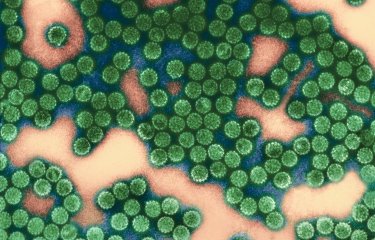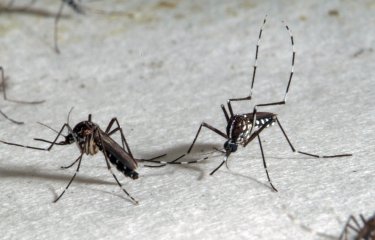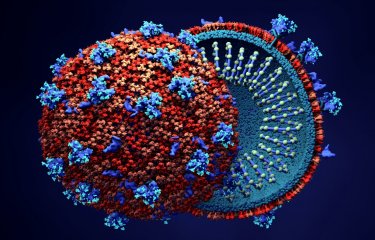The Lassa arenavirus causes hemorrhagic fever and is a major problem in many West African countries, claiming 5,000 to 6,000 lives every year. There is therefore an urgent need to develop treatments and prepare for potential outbreaks. An international study involving Institut Pasteur researchers has reported the results of Phase I clinical trial for a Lassa fever vaccine.
Vaccine candidates to counter the threat of an epidemic
Lassa fever is a zoonotic disease whose primary host is the Natal multimammate rat, a rodent living in close proximity to human populations that can shed the virus in its feces. "This disease is endemic to the regions where the animal lives," explains Sylvain Baize, Head of the Institut Pasteur's Biology of Viral Emerging Infections Unit at the International Center for Infectiology Research (CIRI, CNRS/École normale supérieure de Lyon/Inserm/Claude Bernard Lyon 1 University). "The virus circulates almost constantly in Africa, especially in Nigeria, which is the most affected and also the most densely populated country in Africa. In total, it is estimated that 160 to 180 million people are at risk." Given the high mortality rate and the scarcity of effective drugs, vaccination is the most promising public health strategy.
Two publications published in March 2023 in international journals (Nature Communications and The Lancet) report on the work of Institut Pasteur researchers to develop a Lassa fever vaccine, in particular the results of the first clinical trial in humans.
A fast-acting vaccine with no significant side effects
In 2019, Sylvain Baize's team developed two vaccine candidates based on live attenuated viruses modified to express Lassa virus antigens. The first vaccine candidate, developed from the measles virus, was selected for a clinical trial, thanks in part to funding from the Coalition for Epidemic Preparedness Innovations (CEPI).
For more information, you can read the 2019 article here: Lassa fever: vaccine set to be trialed
The article, published in Nature Communications, reports the results of the preclinical trial, while the results of the human trials were published in The Lancet. This was the first Phase I trial of a vaccine candidate against Lassa fever.
"In the preclinical trial, we wanted to know whether the vaccine produces immunity quickly after administration, which is important when responding to a new epidemic," says the researcher. This complements the long-term protection observed in a 2021 study. The other publication aimed to demonstrate the vaccine's safety in a small number of individuals to ensure that it would be well tolerated without significant side effects.
While the results of the preclinical trial and the Phase I clinical trial are encouraging, further research is being undertaken to confirm the vaccine candidate's efficacy. Sylvain Baize's team is also conducting research on another vaccine candidate based on a virus called Mopeia, which is closely related to the Lassa virus but not harmful to humans.
For more information, you can read the article here: Development of a pentavalent vaccine against New World arenaviruses
Sources:
Rapid protection induced by a single-shot Lassa vaccine in male cynomolgus monkeys, Nature Communications, March 11, 2023
Mathieu Mateo1,2, Stéphanie Reynard1,2, Natalia Pietrosemoli3, Emeline Perthame3, Alexandra Journeaux1,2, Kodie Noy1,2, Clara Germain1,2, Xavier Carnec1,2, Caroline Picard 1,2, Virginie Borges-Cardoso1,2, Jimmy Hortion1,2, Hélène Lopez-Maestre3, Pierrick Regnard4, Lyne Fellmann4, Audrey Vallve5, Stéphane Barron5, Ophélie Jourjon5, Orianne Lacroix5, Aurélie Duthey5, Manon Dirheimer6, Maïlys Daniau7, Catherine Legras-Lachuer7, Caroline Carbonnelle5, Hervé Raoul 5, Frédéric Tangy8, Sylvain Baize1,2
1 - Biology of Viral Emerging Infections Unit, Institut Pasteur, 69007 Lyon, France
2 - CIRI, International Center for Infectiology Research, University of Lyon, Inserm U1111, École normale supérieure de Lyon, Claude Bernard Lyon 1 University, CNRS UMR5308, 69007 Lyon, France
3 - Institut Pasteur, Université Paris Cité, Bioinformatics and Biostatistics Hub, Paris, France
4 - SILABE, University of Strasbourg, Fort Foch, Niederhausbergen, France
5 - Inserm-Jean Mérieux BSL-4 laboratory, Inserm US003, 69007 Lyon, France
6 - Inserm, Auvergne Rhône-Alpes regional delegation, 69500 Bron, France
7 - Viroscan 3D SAS, Trévoux, France
8 - Vaccine Innovation Laboratory, Institut Pasteur, 75015 Paris, France
Immunogenicity, safety, and tolerability of a recombinant measles-vectored Lassa fever vaccine: a randomised, placebo-controlled, first-in-human trial, The Lancet, March 16, 2023
Roland Tschismarov1, Pierre Van Damme2, Clara Germain3,4, Ilse De Coster2, Mathieu Mateo3,4, Stephanie Reynard3,4, Alexandra Journeaux3,4, Yvonne Tomberger1, Kanchanamala Withanage2, Denise Haslwanter1, Katherine Terler1, Sabrina Schrauf1, Matthias Müllner1, Erich Tauber1, Katrin Ramsauer1, Sylvain Baize3,4
1 - Themis Bioscience, Vienna, Austria, a subsidiary of Merck & Co, Rahway, NJ, USA
2 - Center for the Evaluation of Vaccination, Vaccine and Infectious Disease Institute, University of Antwerp, Antwerp, Belgium
3 - Biology of Viral Emerging Infections Unit, Institut Pasteur, Lyon, France;
4- International Center for Infectiology Research, University of Lyon, Inserm, U1111, Claude Bernard Lyon 1 University, CNRS, UMR5308, ENS de Lyon, Lyon, France





